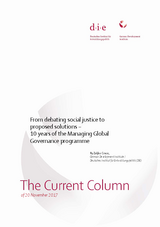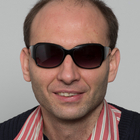From debating social justice to proposed solutions - 10 years of the Managing Global Governance programme
Crncic, ZeljkoThe Current Column (2017)
Bonn: German Development Institute / Deutsches Institut für Entwicklungspolitik (DIE), The Current Column of 20 November 2017
Bonn, 20 November 2017. So far, 2017 has been a year of turbulent events. Diplomatic tensions, wars and global problems such as global warming and economic inequality have featured on the agenda. In view of this situation, it is encouraging to know that the 2030 Agenda exists as a common reference point in the relationships between states. During faltering dialogue processes in particular, networks such as Managing Global Governance (MGG), a platform maintained by the German Development Institute / Deutsches Institut für Entwicklungspolitik (DIE) in co-operation with partner institutions, become all the more relevant in the discussion of global problems and inequalities, as well as in the development of solutions. One key discussion - which is also the focus of our MGG alumni and partner meeting this week - is therefore the question of global justice. Global justice, what does it mean? The political and economic relations between states are often characterised by great inequality. The countries of the South often complain - justifiably - of significant grievances such as unequal market access or the environmentally-detrimental extraction of resources by multinational companies and the repatriation of profits to other countries. For this reason, under the banner of global justice a number of academics and activists are calling for global inequality to be overcome. Prominent representatives of this position include: the philosopher John Rawls (Harvard University), who died in 2002; the economist, philosopher and Nobel Prize winner Amartya Sen (Harvard University) as well as Martha Nussbaum, philosopher and Professor of Law and Ethics (University of Chicago). Nussbaum worked to further develop Sen’s Capability Approach for measuring human development and drew up a list with ten capabilities that constitute components of a good life. These include physical integrity, the ability to live a self-planned life and the opportunity for freedom of speech. The 2030 Agenda enables – and necessitates – a specification of the justice debate beyond academic discourse. Specific, common steps The realisation of global justice often fails due to a lack of co-operation between representatives of different institutions. One specific project, which has been in place for ten years and seeks to rectify this defect, is the Managing Global Governance (MGG) dialogue platform. MGG was launched in 2006 by the BMZ together with the DIE and what was then the InWEnt (now GIZ), commencing at the DIE in early 2007 under the name Global Governance School. The programme brings together academics and scientists as well as representatives of political institutions from Germany and six emerging nations (Mexico, Brazil, South Africa, India, Indonesia and China), meeting regularly in different formats. These include the MGG Academy, which brings together young junior leaders from the aforementioned countries and Germany/Europe in Bonn, over a period of nearly four months. After an academic phase, the participants develop a project that offers solutions for existing problems. In the manner of the 2030 Agenda, the junior executives attempt to develop ideas, for example for sustainable tourism. In addition, the network also offers further formats, for example where the network members work to introduce voluntary production standards in the partner countries. From 20 to 22 November the network is celebrating ten years of its existence with a major alumni and partner conference in Bonn. Over 150 guests will have the opportunity to discuss issues relating to the 2030 Agenda and global justice in a range of different formats. For example, a panel discussion will introduce an alternative justice concept from Egypt, followed by a discussion of the concept from various different aspects. The participants will cover the 2030 Agenda and the concept of global justice on specific projects from their own areas of work, such as the setting of standards and norms in the production of goods or intergovernmental co-operation. In this they will be able to draw on extensive resources, as the majority of perspectives are themselves covered by the expertise from the MGG network. The subject of global justice is an ideal. However, with the resolution of the 2030 Agenda there is a chance to call for, examine and implement specific measures within this scope. The personal exchange of knowledge, joint learning and the formulation of recommendations for action for relevant actors, as practiced by MGG in its network for the past ten years, contributes here to the specification of these objectives - and consequently a step forward from debate towards action.


